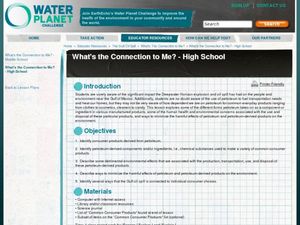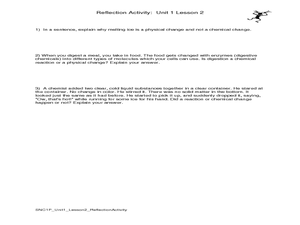Curated OER
I Will Survive!
The students will be given approximately five minutes to individually brainstorm general plant and animals adaptations that they already know about. The class will use these as a starting point to develop a KWL chart specific to desert...
Curated OER
Energy Content Of Foods And Fuels
Students engage in a study of food and how it used as fuel for the human body. They research how biological systems require energy and compare them to the physical science systems like machines. They compare and contrast what they have...
Curated OER
Picture Scramble: Striped Possum, Short-beaked Echidna, Feral Goat
In this science and visual discrimination worksheet, students examine images of a striped possum, short-beaked echidna and feral goat. Next to each picture is the same image which has been divided into 9 pieces and scrambled. Students...
Curated OER
Microscopes and Crystals
Students observe crystals under the microscope. In this science lesson, students compare how the crystal look like using their eyes, hand lens and microscope. They identify the type of crystal based on the amount of light they allow to...
Curated OER
Animals: Here and Now
Discuss and identify natural habitats of animals commonly found in zoos. The class constructs and displays small "zoo like" models to show a chosen animal habitat. They write a short story or diary about an animal or pet of their choice....
Curated OER
Mud Fossils
Young scholars create their own fossils in an activity using plaster of paris and a variety of objects which can be fossils, e.g. chicken bones, twigs, shells, etc. After making their fossils, they allow them to dry and discuss time and...
Curated OER
Tell Someone About Earth Day
Students discuss ways in which grown ups can save energy, money and the Earth in preparation for sending out Earth Day e-cards. They make an Earth Day action list.
Curated OER
Development of Industrial New Hampshire
Students work in groups to research and share information about several different topics that were part of the development of Industrial New Hampshire. Students complete five parts of the project which include researching, role playing...
Curated OER
Tee Off!
Students explore about one of the many products created by gain-based process. They investigate the ways agriculture can protect and preserve the environment. Pupils use their scientific processing skills to conduct a full inquiry based...
Curated OER
What's the Connection to Me?
Students discuss the impact of oil spill to the environment and to their daily lives. In this environmental science lesson plan, students research the pros and cons of petroleum based products. They share their findings in class.
Curated OER
Puberty
Eighth graders describe the changes their body undergoes during puberty. In this health science instructional activity, 8th graders explain how the hypothalamus and pituitary gland play a major role in the process. They identify the...
Curated OER
Picture Scramble: Plant, Butterfly and Duck
In this science and visual discrimination worksheet, learners examine images of a plant, butterfly and duck. Next to each picture is the same image which has been divided into 9 pieces and scrambled. Students place the numbers 1 through...
Curated OER
Picture Scramble: Crested Porcupine, Tree Squirrel, African Civet
In this science and visual discrimination worksheet, students examine images of a crested porcupine, tree squirrel and African civet. Next to each picture is the same image which has been divided into 9 pieces and scrambled. Students...
Curated OER
Sea World Fieldtrip Follow-up
Students create a graphic organizer in preparation for a web page about a specific science-related topic. This lesson is used as a follow-up to a field trip experience and can be adapted for many different subjects.
Curated OER
Efficiency
Fourth graders work cooperatively to investigate the efficiency of various household appliances. They share their findings in three to five minute oral presentations.
Curated OER
Dream Machines
Students explore the modern applications of robots and create one of the five parts of a robot that could solve a hypothetical public works problem. They study about the use of robots for laying fiber-optics cable in New Mexico by...
Curated OER
Cell Structure and DNA
Sixth graders identify, locate and describe the function of the parts of a cell. In groups, they state the five stages of mitosis and put them in the correct order. They are introduced to the structure of DNA and mRNA and how they...
Curated OER
Air Quality and Transportation
Second graders study about air pollution and the effects it has on our Earth. Students tally cars on a sheet that has been categorized as follows: One person in car, two persons in car, or three or more persons in car. Students go to...
Curated OER
Litter Prevention
Students determine why litter is undesirable and that littering is a behavior that can be changed. They rank a variety of litter items from "most undesirable" to "least undesirable" and discuss their reasoning. They group the "litter"...
Curated OER
Physical and Chemical Changes
Students differentiate physical and chemical changes. In this chemistry lesson, students identify five indicators that a chemical change took place. They complete a reflection journal at the end of the activity.
Curated OER
Integrated Skills and Speaking
Students work in pairs to decode a message that uses character adjectives vocabulary and counting skills. They design an "ideal friend" by listing their top five desired character traits.
Curated OER
Food Chains
Students study food chains by creating their own slide show using KidPix. They compare information after sharing their slide shows as a whole group. As the children are watching the slide shows of their peers, they tally every time...
Curated OER
Ozone and Temperature Data Analysis, South Pole Antarctica
Students discuss the layers of the atmosphere, and the history of the ozone hole. They discuss the chemistry of the ozone formation. Students compare seasonal data collected with ozonesondes. They compare Antarctic and Arctic ozone hole...
Curated OER
What Plants Need in Order to Survive and Grow: Light
Students conduct an experiment to evaluate whether plants need light to survive and grow. They observe and gather data about plant responses to different growth regimes, analyze the data, and make conclusions about basic plant needs.
Other popular searches
- 5 E Science Magnets
- 5 E Science Lessons
- 5 E Science Forces
- Science 5 E Model
- Science 5 E
- Life Science 5 E
- Science 5 E Model
- 5 E Science Lesson Plans
- 5 E Model Science Lessons
- Physical Science 5 E
- 5 E Science Flowers























